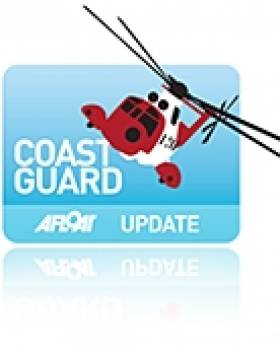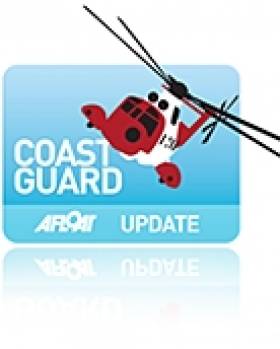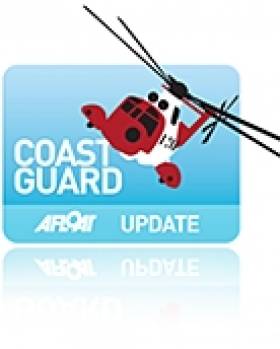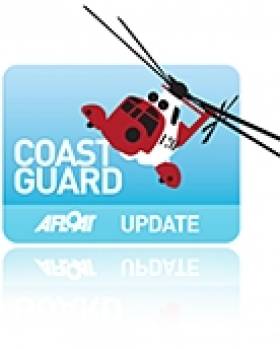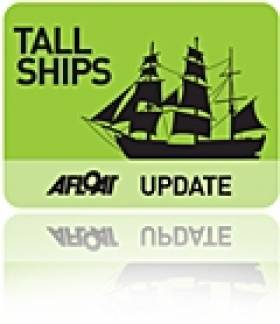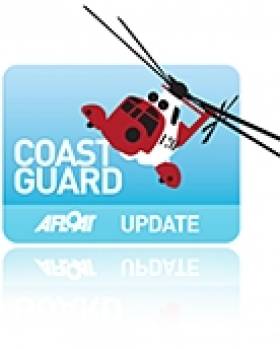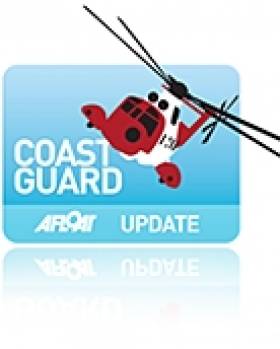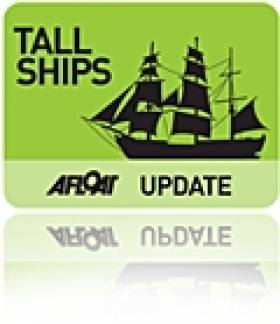Displaying items by tag: Greenock
Belfast Coastguard Manager Resigns As Station Takes On Extra Load
#Coastguard - For Argyll in Scotland reports that Richard Newell has resigned from his post as rescue co-ordination centre manager at Belfast Coastguard.
The news comes some weeks after the command base took on extra responsibility with the permanent closure of the Clyde coastguard station last month.
Britain's Maritime and Coastguard Agency (MCA) confirmed to the website that Newell resigned from his position around two weeks ago - and that he has assured the agency that his decision has no connection with the streamlining plans being undertaken across Britain's coastguard network.
However, For Argyll alleges Newell had made it known locally that "if he considered the future [of the coastguard service] was becoming dangerous, then he would go".
As previously reported on Afloat.ie, campaigners for the Clyde coastguard station in western Scotland were taken aback by the early transfer of helicopter dispatches to Belfast and Stornoway in November, ahead of the base's permanent closure on 18 December last.
More than 30 jobs were lost with the scrapping of the Clyde control centre at Greenock, with much of its role now being taken up by the Belfast command centre at Bangor across the North Channel - a change to the original plan for Scottish stations to share the load till 2015.
'Early Closure' of Clyde Coastguard Surprises Campaigners
#COASTGUARD - Campaigners for the Clyde coastguard station in western Scotland have suffered a blow with the news that all calls are now being routed to Stornoway and Belfast as of last night.
BBC News reports on a document leaked to the Coastguard SOS Campaign, which outlines that while the Clyde station itself is scheduled to close on 18 December, control of aerials (ie helicopter dispatches) to the stations at Stornoway and Belfast was on schedule to be completed by yesterday evening (Friday 16 November).
Campaigner Dennis O'Connor said this move meant that "Clyde will cease to exist operationally" from last night.
He also described it as a "direct challenge" to concerns from the Transport Select Committee in Westminster that the closure programme had started early with the closure of Forth coastguard in September "despite assurances that the replacement system of operation would be fully tested before any closures took place".
However, a spokesperson for the Maritime and Coastguard Agency said that the handover period "has been planned for some time. All the staff have been informed well in advance."
As previously reported on Afloat.ie, the scrapping of the Clyde control centre at Greenock will see the loss of 31 jobs, with much of its role being taken up by the Belfast coastguard at Bangor across the North Channel - a change to the original plan for Scottish stations to share the load till 2015.
#COASTGUARD - Campaigners opposed to the closure of the Clyde coastguard station in western Scotland will next Friday hold a red flare protest against the UK government's plans.
STV News reports that a flotilla of boats will gather at the Greenock Navy Buildings on the evening of 31 August to release red flares in "a show of thanks for the coastguard for their hard work and dedication", acccording to Save Clyde Coastguard campaign founder John Houston.
He added: "We realise that the centre is going to close. That is a given. It would take a miracle now to have that rescinded by the government."
As previously reported on Afloat.ie, staff at the Clyde station had their hopes of a reprieve dashed after a U-turn on assurances from British Prime Minister David Cameron.
The scrapping of the control centre at Greenock will see the loss of 31 jobs, with future River Clyde rescues being handled from stations around Scotland until 2015, when responsibilty will transfer across the North Channel to the Bangor control centre in Northern Ireland.
Campaigners and staff alike have shown concerns over the loss of local knowledge that could be vital to saving lives in difficult search and rescue operations.
STV News has much more on the story HERE.
Clyde Coastguard Staff Hopes Dashed After U-Turn On Reprieve
#COASTGUARD - Staff at the Clyde coastguard in Scotland have been devastated to learn that their station is still slated for closure after a U-turn on assurances from the British prime minister.
The Lennox Herald reports that David Cameron sent a letter to local campaigners Coastguard SOS which stated that all coastguard stations facing the chop would "remain open until 2015".
Rescue personnel at Clyde - who went on strike in June in protest at the treatened closure of the Western Scottish station - had been celebrating the reprieve until just days later, when the prime minister reversed his position and confirmed that planned closures would go ahead at the end of this year.
The scrapping of the Greenock control centre will see the loss of 31 jobs, with future River Clyde rescues being handled from stations around Scotland until 2015 when responsibilty will transfer across the North Channel to the Bangor control centre in Northern Ireland.
“When the prime minister writes letters like that, you don’t expect them to be wrong," said a spokesperson for Public and Commercial Services (PCS) union representing Clyde staff. “It starts playing havoc with people’s lives.”
The Lennox Herald has more on the story HERE.
IWDG Secures 75% Funding for Celtic Mist Refit
#TALL SHIPS - The Irish Whale and Dolphin Group (IWDG) has secured three-quarters of the funding it required to refit its research vessel Celtic Mist.
According to The Irish Times, the Clare Local Development Company has approved the allocation of a €48,000 grant towards the refurbishment of the ketch.
The work will be carried out by Cathal Blunnie and several sub-contractors, and involves stripping down the main cabin and removing the bath and shower to increase space for crew berths.
While the ship's clock will be retained, the ship’s wheel in the main cabin will be removed and presented to the Haughey family as a gesture of appreciation.
As previously reported on Afloat.ie, the 52-foot yacht - which was gifted by the Haughey family to the IWDG to assist in its marine wildlife conservation work - entered dry dock last November in preparation for the refit work, after relocating to its new berth at Kilrush, Co Clare in July.
This followed its last jaunt at sea in its former guise, completing a leg of the Tall Ships Races from Waterford to Greenock in Scotland.
The cost of refurbishing the yacht for research and training purposes is expected to top €60,000, with an annual running cost of some €20,000, for which the IWDG is seeking ongoing financial assistance.
The group aims to get the Celtic Mist back at sea before the summer.
NI First Minister Highlights Need for Local Knowledge Over Clyde Coastguard Closure Threat
#COASTGUARD - Northern Ireland's First Minister has highlighted the need for local knowledge in light of the threatened closure of the Clyde coastguard station in Scotland.
As previously reported by Afloat.ie, the control centre at Greenock is set to be scrapped under the UK government's plans to streamline Britain's coastguard network.
Some 31 jobs will be lost in the closure, while rescues on the River Clyde and western Scotland will in future be handled from Northern Ireland's Bangor station on Belfast Lough - which itself was saved from the chop following a review over the summer.
In a letter to MSP for West of Scotland, Stuart McMillan, First Minister Peter Robinson said that his and his government's concerns "centre on the safety of the people using our coasts and seaways, which could be jeopardised by the loss of local knowledge and experience."
McMillan welcomed his support, adding that "despite the consultation period being over, it is not too late for the UK Government listen to the growing number of voices saying that this must be reversed.
“Closing coastguard stations down including Clyde is a short-sighted and dangerous move which puts saving money over saving lives.”
Clyde Campaigners Hope for U-Turn on Coastguard Closure Proposal
Scottish campaigners have made their final pleas to save the Clyde coastguard station from closure, the Greenock Telegraph reports.
Under the UK government's plans to streamline Britain's coastguard network, the control centre at Greenock is set to be scrapped with the loss of 31 jobs, while River Clyde rescues will in future be handled from Northern Ireland.
As previously reported on Afloat.ie, Northern Ireland's only dedicated search and rescue centre on Belfast Lough was saved from the chop following a review of plans to reform the Maritime and Coastguard Agency's nationwide network.
A consultation on the propose closure concluded yesterday, and locals join staff, union leaders and politicians in hoping they can persuade the government to give Clyde a reprieve.
"Local knowledge and understanding are vital when dealing with emergency situations." said local MSP Stuart McMillan.
"To remove a committed and fully functioning coastguard service with expert local knowledge would leave a void that could not be filled by an over stretched centre in Belfast."
The Greenock Telegraph has more on the story HERE (registration required).
Tall Ship Refloated Off Scotland
As previously reported on Afloat.ie, the 100-foot-long Irene of Bridgwater, with 10 people on board, became stuck in Lamlash Bay on its way to port at Greenock - one of five ports on the route of the 2011 Tall Ships Races.
A spokesperson for Clyde Coastguard told STV that the ship was refloated at 3.45am this morning.
"There were no injuries and no damage," she added.




























